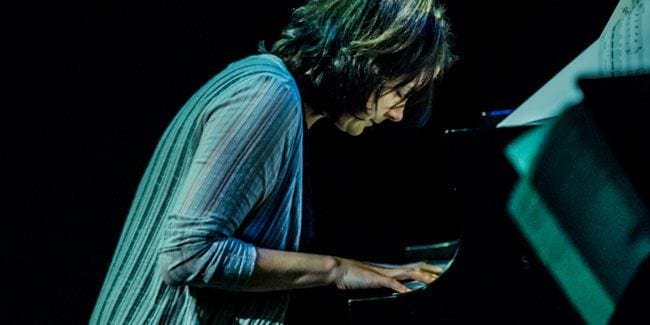
As in abstract art, the solo piano music on Kris Davis’ Massive Threads uses a language of expression not linked to traditional forms. Melodic structure and concessions to accessibility are abandoned in favor of an approach to playing focusing on textures and impressions.
Davis is a 33-year-old New York-based pianist originally from Canada. She has released eight albums as a leader, though Massive Threads is only her second solo release. A very busy musician, she also plays with a trio called Paradoxical Frog and has issued two other albums this year alone – one with a quintet and one with an improvisatory group called Lark. If that wasn’t enough, she also teaches at the School for Improvised Music.
She’s has been getting much attention lately for her dynamic and unique approach to the piano. “Vibrant”, “intimate”, “explosive”, and “peaceful” are all words used in the press to describe her music. Hers is a sound and style that’s hard to pin down. If you wanted to classify the compositions on Massive Threads under a particular genre, you might try free jazz, or avant-garde, or maybe modern classical. These are all terms that touch on what’s going on, but really only scratch the surface.
Above all, its music that requires thought, cerebral in the sense that it’s “wild mind” music – music played by a gifted pianist exploring the range of her instrument, with no boundaries. She’s stated in interviews that one of her goals is blurring the lines between composition and improvisation. Sometimes this results in discordant flurries of quickly played notes and other times harmonious notes with lots of space between them.
Remarkably, all the music on Massive Threads was recorded in one day in October of 2012, and all of it is improvised except a playful and spacious cover of Thelonious Monk’s “Evidence”.
“Ten Exorcists” is one of the more fascinating tracks, in terms of the sounds achieved. Davis’ playing attains a percussiveness in the rhythmic patterns she’s hammering out, so much so that the music leaves the realm of the acoustic piano and begins to sound electronically generated.
Yet, it’s the title song that’s the centerpiece of the album. Originally composed for six pianists, the shifting dynamics and moods are unsettling as the piece moves from a section of chaotic note clusters to a quiet, stark passage. This evolves into doom-laden chords, dark and angry, and then back to quiet, pensive territory.
Massive Threads is not a collection to be put on as background music. It’s an album that requires attention to notice the subtleties and to tune-in to the patterns throughout each track. It requires repeated listening to fully appreciate the light and shade coursing through each song and the (massive) threads that hold it all together.
